|
The Return of Tarzan
Chapter 6: A Duel
(Texte étatsunien original)
|
Le Retour de Tarzan
Chapitre 6: Le Duel
(Version française d’Anne
Frejer)
|
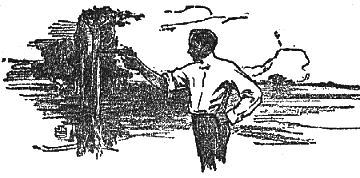 Tête de chapitre de J. Allen St. John
(1915)
Tête de chapitre de J. Allen St. John
(1915)
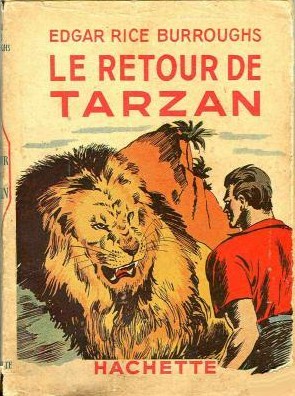 D’ARNOT was
asleep when Tarzan entered their apartments after leaving Rokoff’s. Tarzan
did not disturb him, but the following morning he narrated the happenings
of the previous evening, omitting not a single detail.
D’ARNOT was
asleep when Tarzan entered their apartments after leaving Rokoff’s. Tarzan
did not disturb him, but the following morning he narrated the happenings
of the previous evening, omitting not a single detail.
“What a fool I have been,” he concluded. “De Coude and his wife were
both my friends. How have I returned their friendship? Barely did I escape
murdering the count. I have cast a stigma on the name of a good woman.
It is very probable that I have broken up a happy home.”
“Do you love Olga de Coude?” asked D’Arnot.
“Were I not positive that she does not love me I could not answer
your question, Paul; but without disloyalty to her I tell you that I do
not love her, nor does she love me. For an instant we were the victims
of a sudden madness—it was not love—and it would have left us, unharmed,
as suddenly as it had come upon us even though De Coude had not returned.
As you know, I have had little experience of women. Olga de Coude is very
beautiful; that, and the dim light and the seductive surroundings, and the
appeal of the defenseless for protection, might have been resisted by a more
civilized man, but my civilization is not even skin deep—it does not go
deeper than my clothes.
“Paris is no place for me. I will but continue to stumble into more
and more serious pitfalls. The man-made restrictions are irksome. I feel
always that I am a prisoner. I cannot endure it, my friend, and so I think
that I shall go back to my own jungle, and lead the life that God intended
that I should lead when He put me there.”
“Do not take it so to heart, Jean,” responded D’Arnot. “You have acquitted
yourself much better than most ‘civilized’ men would have under similar
circumstances. As to leaving Paris at this time, I rather think that Raoul
de Coude may be expected to have something to say on that subject before
long.”
|
 Quand Tarzan arriva chez lui, d’Arnot dormait. Il ne le réveilla
pas. Mais le lendemain matin il lui fit part en détail de ses aventures
de la veille.
Quand Tarzan arriva chez lui, d’Arnot dormait. Il ne le réveilla
pas. Mais le lendemain matin il lui fit part en détail de ses aventures
de la veille.
«Quel fou j’ai été. De Coude
et sa femme étaient tous deux mes amis et je le leur ai bien rendu.
C’est tout juste si je n’ai pas assassiné le comte. Et j’ai compromis
une femme fidèle. Il est probable que j’ai détruit un bon
ménage.»
«Aimez-vous Olga de Coude?» demanda
d’Arnot.
«Si je n’étais pas sûr qu’elle
ne m’aime pas j’aurais du mal à répondre; mais sans être
malhonnête à son égard, je puis vous dire que je ne
l’aime pas et qu’elle ne m’aime pas. Pendant un instant nous avons été
fous. Ce n’était pas de l’amour. Nous nous serions quittés
comme si rien ne s’était passé entre nous, même si de
Coude n’était pas rentré. J’ai connu peu de femmes. Olga de
Coude est très belle; la faible lumière, le cadre séduisant,
et l’appel de l’être sans défense sont autant de choses auxquelles
un homme civilisé aurait résisté. Mais moi je ne suis
civilisé qu’en surface.
«Paris n’est pas fait pour moi. Je vais
me heurter sans cesse à de nouveaux pièges. Les limites imposées
par l’homme me sont pénibles.
«J’ai constamment l’impression d’être
prisonnier et je ne peux le supporter. Je crois que je vais retourner dans
la jungle et mener la vie que Dieu a voulue pour moi lorsqu’il m’a fit naître
là-bas.»
«Ne prenez pas cela tellement à cœur»,
répondit d’Arnot. «Vous vous en êtes tiré beaucoup
mieux que bien des hommes “civilisés”. Quant à quitter Paris [p.58] maintenant, je crains que
Raoul de Coude n’ait son mot à dire sur la question.»
|
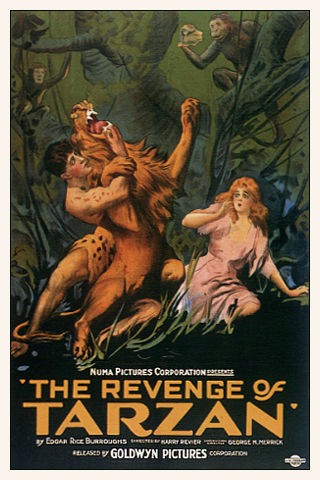 Nor was D’Arnot
mistaken. A week later on Monsieur Flaubert was announced about eleven
in the morning, as D’Arnot and Tarzan were breakfasting. Monsieur Flaubert
was an impressively polite gentleman. With many low bows he delivered Monsieur
le Count de Coude’s challenge to Monsieur Tarzan. Would monsieur be so
very kind as to arrange to have a friend meet Monsieur Flaubert at as early
an hour as convenient, that the details might be arranged to the mutual
satisfaction of all concerned?
Nor was D’Arnot
mistaken. A week later on Monsieur Flaubert was announced about eleven
in the morning, as D’Arnot and Tarzan were breakfasting. Monsieur Flaubert
was an impressively polite gentleman. With many low bows he delivered Monsieur
le Count de Coude’s challenge to Monsieur Tarzan. Would monsieur be so
very kind as to arrange to have a friend meet Monsieur Flaubert at as early
an hour as convenient, that the details might be arranged to the mutual
satisfaction of all concerned?
Certainly. Monsieur Tarzan would be delighted to place his interests
unreservedly in the hands of his friend, Lieutenant D’Arnot. And so it
was arranged that D’Arnot was to call on Monsieur Flaubert at two that afternoon,
and the polite Monsieur Flaubert, with many bows, left them.
When they were again alone D’Arnot looked quizzically at Tarzan.
“Well?” he said.
“Now to my sins I must add murder, or else myself be killed,” said
Tarzan. “I am progressing rapidly in the ways of my civilized brothers.”
“What weapons shall you select?” asked D’Arnot. “De Coude is accredited
with being a master with the sword, and a splendid shot.”
“I might then choose poisoned arrows at twenty paces, or spears at
the same distance,” laughed Tarzan. “Make it pistols, Paul.”
“He will kill you, Jean.”
“I have no doubt of it,” replied Tarzan. “I must die some day.”
“We had better make it swords,” said D’Arnot. “He will be satisfied
with wounding you, and there is less danger of a mortal wound.”
“Pistols,” said Tarzan, with finality.
D’Arnot tried to argue him out of it, but without avail, so pistols
it was.
D’Arnot returned from his conference with Monsieur Flaubert shortly
after four.
|
 D’Arnot ne s’était pas trompé. Une semaine plus tard, M. Flaubert
sonna au moment où les deux amis déjeunaient. M. Flaubert
fut très courtois. Il apprit à Tarzan que le comte de Coude
le provoquait en duel et le pria de désigner un ami le plus tôt
possible pour que tous deux conviennent des conditions à la satisfaction
de toutes les parties intéressées.
D’Arnot ne s’était pas trompé. Une semaine plus tard, M. Flaubert
sonna au moment où les deux amis déjeunaient. M. Flaubert
fut très courtois. Il apprit à Tarzan que le comte de Coude
le provoquait en duel et le pria de désigner un ami le plus tôt
possible pour que tous deux conviennent des conditions à la satisfaction
de toutes les parties intéressées.
Tarzan répondit qu’il serait ravi de placer
sans restriction, ses intérêts entre les mains de son ami le
lieutenant d’Arnot. Il fut décidé que d’Arnot se rendrait
chez M. Flaubert cet après-midi même.
Quand ils furent à nouveau seuls, d’Arnot
regarda Tarzan.
«Eh bien qu’en dites-vous?» demanda-t-il
railleur.
«Maintenant, je dois ajouter un meurtre
à tous mes autres péchés, ou bien me faire tuer moi-même
», dit Tarzan. Je deviens de plus en plus civilisé.»
«Quelle arme allez-vous choisir? »
demanda d’Arnot. «De Coude est réputé maître au
fleuret et tireur d’élite.»
«Je ferais aussi bien de choisir les flèches
empoisonnées ou la lance », dit Tarzan en riant. «Je
choisis le pistolet.»
«Jean! il vous tuera!»
«Je n’en doute pas; mais comme il nous faut
tous mourir un jour!»
«Vous feriez mieux de choisir le fleuret
», dit d’Arnot. « Il se contentera de vous blesser; vous ne courrez
aucun risque mortel.»
«Non, le pistolet», dit Tarzan obstiné.
D’Arnot essaya de le faire changer d’avis, mais
en vain. Il dut s’en tenir au pistolet. [p.59]
Il revint de son entretien avec M. Flaubert, peu
après quatre heures.
|
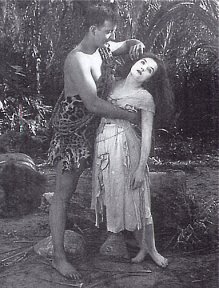 “It is all
arranged,” he said. “Everything is satisfactory. Tomorrow
morning at daylight—there is a secluded spot on the road not far from Etamps.
For some personal reason Monsieur Flaubert preferred it. I
did not demur.”
“It is all
arranged,” he said. “Everything is satisfactory. Tomorrow
morning at daylight—there is a secluded spot on the road not far from Etamps.
For some personal reason Monsieur Flaubert preferred it. I
did not demur.”
“Good!” was Tarzan’s only comment. He did not refer to the matter
again even indirectly. That night he wrote several letters before he retired.
After sealing and addressing them he placed them all in an envelope addressed
to D’Arnot. As he undressed D’Arnot heard him humming a music-hall ditty.
The Frenchman swore under his breath. He was very unhappy, for he
was positive that when the sun rose the next morning it would look down
upon a dead Tarzan. It grated upon him to see Tarzan so unconcerned.
“This is a most uncivilized hour for people to kill each other,” remarked
the ape-man when he had been routed out of a comfortable bed in the blackness
of the early morning hours. He had slept well, and so it seemed that his
head scarcely touched the pillow ere his man deferentially aroused him.
His remark was addressed to D’Arnot, who stood fully dressed in the doorway
of Tarzan’s bedroom.
D’Arnot had scarcely slept at all during the night. He was nervous,
and therefore inclined to be irritable.
“I presume you slept like a baby all night,” he said.
Tarzan laughed. “From your tone, Paul, I infer that you rather harbor
the fact against me. I could not help it, really.”
“No, Jean; it is not that,” replied D’Arnot, himself smiling. “But
you take the entire matter with such infernal indifference—it is exasperating.
One would think that you were going out to shoot at a target, rather than
to face one of the best shots in France.”
Tarzan shrugged his shoulders. “I am going out to expiate a great
wrong, Paul. A very necessary feature of the expiation is the marksmanship
of my opponent. Wherefore, then, should I be dissatisfied? Have you not
yourself told me that Count de Coude is a splendid marksman?”
“You mean that you hope to be killed?” exclaimed D’Arnot, in horror.
“I cannot say that I hope to be; but you must admit that there is
little reason to believe that I shall not be killed.”
Had D’Arnot known the thing that was
in the ape-man’s mind—that had been in his mind almost from the first intimation
that De Coude would call him to account on the field of honor—he would have
been even more horrified than he was.
|
 «Tout est fixé», dit-il, «et de façon satisfaisante.
Demain matin
à l’aube, dans un endroit isolé, près de la route,
à côté d’Etampes. Pour des raisons personnelles M. Flaubert
a préféré cela. Je n’ai pas élevé
d’objection.»
«Tout est fixé», dit-il, «et de façon satisfaisante.
Demain matin
à l’aube, dans un endroit isolé, près de la route,
à côté d’Etampes. Pour des raisons personnelles M. Flaubert
a préféré cela. Je n’ai pas élevé
d’objection.»
«Bien» fut l’unique commentaire de
Tarzan et il ne reparla plus une seule fois de l’affaire. Ce soir-là,
avant d’aller se coucher, il écrivit plusieurs lettres qu’il cacheta
et mit dans une grande enveloppe à l’adresse d’Arnot. Tandis qu’il
se mettait au lit, d’Arnot l’entendit fredonner un air de cabaret.
Le Français le maudit. Il était
déprimé car il persuadé que Tarzan serait mort le lendemain.
Il hors de lui de voir son ami aussi insouciant.
«C’est une heure peu civilisée pour
s’entre-tuer», remarqua l’homme-singe quand on vint le tirer de son
lit le lendemain. Il avait bien dormi et il lui semblait que sa tête
avait à peine effleuré l’oreiller.
Sa boutade était destinée à
d’Arnot qui, déjà habillé, se tenait dans l’embrasure
de la porte.
D’Arnot avait peu dormi. Et, pour cette raison il nerveux et irritable.
«Je suppose que vous avez dormi comme un
nouveau-né.»
Tarzan rit. «On dirait que vous m’en faites
le reproche. Réellement, je n’ai pu m’en empêcher.»
«Non Jean, ce n’est pas cela», répondit
d’Arnot, souriant lui-même, «mais vous prenez toute cette affaire
avec une indifférence parfaite; c’est exaspérant à
la fin. On penserait que vous allez faire des cartons et non vous mesurer
à l’un des meilleurs tireurs du pays.»
Tarzan haussa les épaules. «Il me
faut payer pour une grosse faute et le prix en sera la qualité de tireur
de [p.60] mon adversaire. Pourquoi
me plaindrais-je? Ne m’avez-vous pas dit vous-même que le comte était
un tireur d’élite?»
«Vous voulez dire que vous espérez
vous faire tuer», s’écria d’Arnot avec horreur.
«Je ne l’espère pas vraiment; mais
il y a peu de raisons de croire que je ne le serai pas.»
Si d’Arnot avait su ce que l’homme-singe avait
dans sa tête depuis le moment où il avait pensé que de
Coude le provoquerai en duel, il aurait été encore plus horrifié.
|
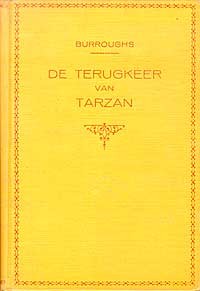 In silence they entered D’Arnot’s great car, and in
similar silence they sped over the dim road that leads to Etamps.
Each man was occupied with his own thoughts. D’Arnot’s
were very mournful, for he was genuinely fond of Tarzan. The great friendship
which had sprung up between these two men whose lives and training had been
so widely different had but been strengthened by association, for they
were both men to whom the same high ideals of manhood, of personal courage,
and of honor appealed with equal force. They could understand one another,
and each could be proud of the friendship of the other.
In silence they entered D’Arnot’s great car, and in
similar silence they sped over the dim road that leads to Etamps.
Each man was occupied with his own thoughts. D’Arnot’s
were very mournful, for he was genuinely fond of Tarzan. The great friendship
which had sprung up between these two men whose lives and training had been
so widely different had but been strengthened by association, for they
were both men to whom the same high ideals of manhood, of personal courage,
and of honor appealed with equal force. They could understand one another,
and each could be proud of the friendship of the other.
Tarzan of the Apes was wrapped in thoughts of the past; pleasant memories
of the happier occasions of his lost jungle life. He recalled the countless
boyhood hours that he had spent cross-legged upon the table in his dead
father’s cabin, his little brown body bent over one of the fascinating picture
books from which, unaided, he had gleaned the secret of the printed language
long before the sounds of human speech fell upon his ears. A smile of contentment
softened his strong face as he thought of that day of days that he had
had alone with Jane Porter in the heart of his primeval forest.
Presently his reminiscences were broken in upon by the stopping of
the car—they were at their destination. Tarzan’s mind returned to the affairs
of the moment. He knew that he was about to die, but there was no fear
of death in him. To a denizen of the cruel jungle death is a commonplace.
The first law of nature compels them to cling tenaciously to life—to fight
for it; but it does not teach them to fear death.
|
 En silence, ils démarrèrent
et prirent la route sombre d’Etampes.
En silence, ils démarrèrent
et prirent la route sombre d’Etampes.
Chacun était préoccupé par
ses propres pensées. Celles d’Arnot étaient lugubres car il
avait une profonde amitié pour Tarzan. Elle était née
entre ces deux hommes dont la vie et l’éducation avaient été
entière ment différentes, et s’était consolidée
car ils partageaient les mêmes idéaux d’humanité, de
courage et d’honneur. Ils se comprenaient, et chacun était fier de
l’amitié que l’autre lui portait.
Tarzan était perdu dans ses souvenirs ;
ceux des circonstances les plus heureuses de sa vie dans la jungle qu’il avait
quittée. Il songea aux heures de son enfance passées dans la
case de son père défunt, son petit corps bruni penché
sur les fascinants livres d’images dans lesquels il avait cueilli le secret
du langage écrit avant que des voix humaines résonnent à
son oreille. Un sourire adoucit son visage fermé quand il pensa à
cette journée qu’il avait passée seul avec Jane Porter au
cœur de sa forêt natale.
Ses pensées furent interrompues par l’arrêt
de la voiture. Ils étaient arrivés. Il savait qu’il serait
mort d’ici peu. Pour un habitant de la jungle l’idée de la mort était
familière. Les lois élémentaires de la nature l’avaient [p.61] obligé à s’accrocher
à la vie, à lutter pour elle, mais pas à craindre la
mort.
|
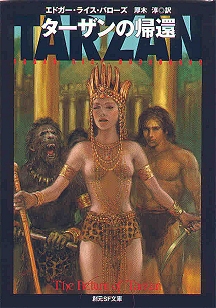 D’Arnot and
Tarzan were first upon the field of honor. A moment later De Coude, Monsieur
Flaubert, and a third gentleman arrived. The last was introduced to D’Arnot
and Tarzan; he was a physician.
D’Arnot and
Tarzan were first upon the field of honor. A moment later De Coude, Monsieur
Flaubert, and a third gentleman arrived. The last was introduced to D’Arnot
and Tarzan; he was a physician.
D’Arnot and Monsieur Flaubert spoke together in whispers for a brief
time. The Count de Coude and Tarzan stood apart at opposite sides of the
field. Presently the seconds summoned them. D’Arnot and Monsieur Flaubert
had examined both pistols. The two men who were to face each other a moment
later stood silently while Monsieur Flaubert recited the conditions they
were to observe.
They were to stand back to back. At a signal from Monsieur Flaubert
they were to walk in opposite directions, their pistols hanging by their
sides. When each had proceeded ten paces D’Arnot was to give the final
signal—then they were to turn and fire at will until one fell, or each
had expended the three shots allowed.
While Monsieur Flaubert spoke Tarzan selected a cigarette from his
case, and lighted it. De Coude was the personification of coolness—was
he not the best shot in France?
Presently Monsieur Flaubert nodded to D’Arnot, and each man placed
his principal in position.
“Are you quite ready, gentlemen?” asked Monsieur Flaubert.
“Quite,” replied De Coude.
Tarzan nodded. Monsieur Flaubert gave the signal. He and D’Arnot stepped
back a few paces to be out of the line of fire as the men paced slowly
apart. Six! Seven! Eight! There were tears in D’Arnot’s eyes. He loved Tarzan
very much. Nine! Another pace, and the poor lieutenant gave the signal
he so hated to give. To him it sounded the doom of his best friend.
|
 D’Arnot et Tarzan arrivèrent les premiers sur le terrain. Un instant
plus tard, de Coude, M. Flaubert et un troisième personnage les rejoignaient;
ce dernier était médecin.
D’Arnot et Tarzan arrivèrent les premiers sur le terrain. Un instant
plus tard, de Coude, M. Flaubert et un troisième personnage les rejoignaient;
ce dernier était médecin.
D’Arnot et M. Flaubert échangèrent
quelques mots à voix basse.
De Coude et Tarzan se tenaient chacun à
un bout du terrain. Puis leurs témoins les appelèrent. Ils avaient
examiné les armes. Les deux hommes qui allaient s’affronter dans un
moment gardèrent le silence tandis que M. Flaubert leur exposait les
règles.
Ils allaient se placer dos à dos. Et, au
signal de M. Flaubert, ils feraient dix pas dans les deux directions opposées,
le pistolet au côté. Au bout des dix pas, d’Arnot donnerait
le signal final, ils se retourneraient et tireraient jusqu’à ce que
l’un d’eux tombe, ou que chacun ait épuisé ses trois balles.
Pendant que M. Flaubert parlait, Tarzan sortit
une cigarette et l’alluma. De Coude était le calme en per sonne. N’était-il
pas le meilleur tireur de France?
Puis chaque témoin plaça son combattant
en position.
«Etes-vous prêts, messieurs»?
demanda Flaubert.
«Oui» répondit le comte, tandis
que Tarzan faisait un signe affirmatif.
Les deux témoins reculèrent pour
ne pas se trouver dans le champ de tir. Et les deux hommes s’éloignèrent
l’un de l’autre, pas à pas. Six, sept. huit. D’Arnot n’en pouvait
plus — son meilleur ami — neuf — encore un pas — et le pauvre lieutenant
donna le signal abhorré qui signifiait la perte de Tarzan.
|
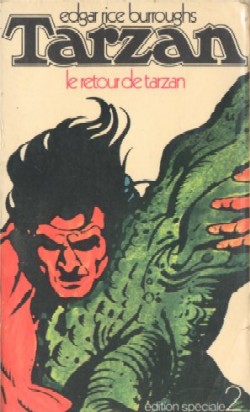 Quickly De
Coude wheeled and fired. Tarzan gave a little start. His pistol still dangled
at his side. De Coude hesitated, as though waiting to see his antagonist
crumple to the ground. The Frenchman was too experienced a marksman not
to know that he had scored a hit. Still Tarzan made no move to raise his
pistol. De Coude fired once more, but the attitude of the ape-man—the utter
indifference that was so apparent in every line of the nonchalant ease of
his giant figure, and the even unruffled puffing of his cigarette—had disconcerted
the best marksman in France. This time Tarzan did not start, but again De
Coude knew that he had hit.
Quickly De
Coude wheeled and fired. Tarzan gave a little start. His pistol still dangled
at his side. De Coude hesitated, as though waiting to see his antagonist
crumple to the ground. The Frenchman was too experienced a marksman not
to know that he had scored a hit. Still Tarzan made no move to raise his
pistol. De Coude fired once more, but the attitude of the ape-man—the utter
indifference that was so apparent in every line of the nonchalant ease of
his giant figure, and the even unruffled puffing of his cigarette—had disconcerted
the best marksman in France. This time Tarzan did not start, but again De
Coude knew that he had hit.
Suddenly the explanation leaped to his mind—his antagonist was coolly
taking these terrible chances in the hope that he would receive no staggering
wound from any of De Coude’s three shots. Then he would take his own time
about shooting De Coude down deliberately, coolly, and in cold blood.
A little shiver ran up the Frenchman’s spine. It was fiendish—diabolical.
What manner of creature was this that could stand complacently with two
bullets in him, waiting for the third?
And so De Coude took careful aim this time, but his nerve was gone,
and he made a clean miss. Not once had Tarzan raised his pistol hand from
where it hung beside his leg.
For a moment the two stood looking straight into each other’s eyes.
On Tarzan’s face was a pathetic expression of disappointment. On De Coude’s
a rapidly growing expression of horror—yes, of terror.
He could endure it no longer.
“Mother of God! Monsieur—shoot!” he screamed.
But Tarzan did not raise his pistol. Instead, he advanced toward De
Coude, and when D’Arnot and Monsieur Flaubert, misinterpreting his intention,
would have rushed between them, he raised his left hand in a sign of remonstrance.
“Do not fear,” he said to them, “I shall not harm him.”
It was most unusual, but they halted. Tarzan advanced until he was
quite close to De Coude.
“There must have been something wrong with monsieur’s pistol,” he
said. “Or monsieur is unstrung. Take mine, monsieur, and try again,” and
Tarzan offered his pistol, butt foremost, to the astonished De Coude.
“Mon Dieu, monsieur!” cried the latter. “Are you mad?”
“No, my friend,” replied the ape-man; “but I deserve to die. It is
the only way in which I may atone for the wrong I have done a very good
woman. Take my pistol and do as I bid.”
“It would be murder,” replied De Coude. “But what wrong did you do
my wife? She swore to me that—”
“I do not mean that,” said Tarzan quickly. “You saw all the wrong
that passed between us. But that was enough to cast a shadow upon her
name, and to ruin the happiness of a man against whom I had no enmity.
The fault was all mine, and so I hoped to die for it this morning. I am
disappointed that monsieur is not so wonderful a marksman as I had been
led to believe.”
|
 Immédiatement, de Coude fit volte-face et tira. Tarzan tressaillit. [p.62]
Immédiatement, de Coude fit volte-face et tira. Tarzan tressaillit. [p.62]
Il ne saisit pas son arme. De Coude hésita,
attendant que son adversaire tombe à terre. Le Français savait
qu’il l’avait touché. Mais Tarzan ne touchait toujours pas à
son arme. De Coude tira une seconde fois. Il était déconcerté
par la nonchalance de l’homme qui fumait imperturbable, sa cigarette. Cette
fois, Tarzan ne tressaillit pas et pourtant là encore, de Coude savait
qu’il l’avait touché.
Soudain une idée folle lui vint: et si
son adversaire tentait sa chance avec calme dans l’espoir de ne recevoir
aucune blessure mortelle.
Et lorsque de Coude aurait épuisé
ses trois balles, il prendrait tout son temps pour l’abattre froidement.
Le Français fut pris d’un frisson. Ce plan était infernal,
machiavélique. Quelle créature était-ce qui puisse le
braver avec deux balles dans le corps et en attendant la troisième.
Cette fois, de Coude visa soigneusement, mais
il n’était plus maître de lui, et la balle manqua son but.
Tarzan n’avait toujours pas saisi son arme.
Les deux hommes se fixèrent un moment.
Sur le visage de Tarzan se lisait une profonde expression de déception;
sur le visage du comte une expression de terreur grandissante.
Ce dernier ne put supporter la tension plus longtemps.
«Au nom du Ciel, monsieur, tirez donc»,
cria-t-il. Mais Tarzan ne leva pas son arme. Il s’avança vers de
Coude, et comme d’Arnot et Flaubert, se méprenant sur ses intentions,
voulaient intervenir, il leur fit signe de s’écarter.
«Je ne lui ferai rien, n’ayez crainte»,
dit-il.
Son geste était inattendu mais ils le laissèrent
faire. Tarzan alla jusqu’au comte.
«Votre pistolet ne doit pas bien fonctionner,
ou alors [p.63] vous n’êtes pas en forme, aujourd’hui, monsieur; essayez
avec mon arme»; et Tarzan lui tendit son pistolet. De Coude, abasourdi,
s’écria:
«Mon Dieu, monsieur! êtes-vous devenu
fou?»
«Non», répondit l’homme-singe,
«mais je mérite la mort. C’est la seule manière pour
moi de réparer le tort que j’ai causé à une honnête
femme. Prenez mon pistolet et faites ce que je vous demande!»
«Mais ce serait un meurtre, monsieur!»
répondit de Coude. «Quel tort avez-vous causé, mon épouse
m’a juré que...»
«Ce n’est pas ce que je veux dire. Tout
ce qui s’est passé entre nous, vous l’avez vu», dit Tarzan.
«Mais c’était suffisant pour ternir sa réputation et
détruire le bonheur d’un homme auquel je ne veux aucun mal.
«Tout est de ma faute, et je suis déçu
que vous n’ayez pas aussi bien visé que je l’espérais.»
|
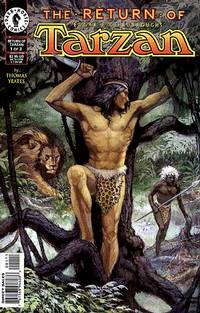 “You say that
the fault was all yours?” asked De Coude eagerly.
“You say that
the fault was all yours?” asked De Coude eagerly.
“All mine, monsieur. Your wife is a very pure woman. She loves only
you. The fault that you saw was all mine. The thing that brought me there
was no fault of either the Countess de Coude or myself. Here is a paper
which will quite positively demonstrate that,” and Tarzan drew from his
pocket the statement Rokoff had written and signed.
De Coude took it and read. D’Arnot and Monsieur Flaubert had drawn
near. They were interested spectators of this strange ending of a strange
duel. None spoke until De Coude had quite finished, then he looked up at
Tarzan.
“You are a very brave and chivalrous gentleman,” he said. “I thank
God that I did not kill you.”
De Coude was a Frenchman. Frenchmen are impulsive. He threw his arms
about Tarzan and embraced him. Monsieur Flaubert embraced D’Arnot. There
was no one to embrace the doctor. So possibly it was pique which prompted
him to interfere, and demand that he be permitted to dress Tarzan’s wounds.
“This gentleman was hit once at least,” he said. “Possibly thrice.”
“Twice,” said Tarzan. “Once in the left shoulder, and again in the
left side—both flesh wounds, I think.” But the doctor insisted upon stretching
him upon the sward, and tinkering with him until the wounds were cleansed
and the flow of blood checked.
One result of the duel was that they all rode back to Paris together
in D’Arnot’s car, the best of friends. De Coude was so relieved to have
had this double assurance of his wife’s loyalty that he felt no rancor at
all toward Tarzan. It is true that the latter had assumed much more of the
fault than was rightly his, but if he lied a little he may be excused, for
he lied in the service of a woman, and he lied like a gentleman.
|
 «Vous dites que tout est de votre faute», demanda le comte vivement.
«Vous dites que tout est de votre faute», demanda le comte vivement.
«Entièrement de ma faute. Votre femme
est innocente. Elle n’aime que vous. J’ai été attiré
chez vous; la lettre que voici vous le prouvera.» Et Tarzan sortit
de sa poche la confession écrite et signée par Rokoff.
De Coude la prit et la lut. D’Arnot et Flaubert
s’étaient rapprochés. Ils attendaient avec intérêt
l’issue de cet étrange duel. Personne ne parlait. De Coude termina
sa lecture et regarda Tarzan.
«Vous êtes un homme digne et courageux;
Dieu merci, je ne vous ai pas tué!»
De Coude était français, et les
Français sont spontanés. Il embrassa Tarzan. M. Haubert embrassa
d’Arnot. Il n’y avait plus personne pour embrasser le docteur. Peut-être
est-ce par dépit qu’il intervint et demanda qu’on le laisse panser
les blessures de Tarzan. [p.64]
«Monsieur, vous avez été blessé
une fois au moins, trois fois peut-être», dit-il.
«Deux», dit Tarzan. «Une fois
à l’épaule gauche, et une autre au côté gauche.
Deux blessures légères, je crois.»
Mais le docteur l’obligea à s’étendre
dans l’herbe et le tapota pour nettoyer les blessures et arrêter l’épanchement
de sang.
Puis, tous ensemble, et plus amis que jamais,
ils retournèrent à Paris dans la voiture d’Arnot. De Coude
soulagé d’avoir obtenu la double assurance de la fidélité
de sa femme ne gardait aucune rancune envers Tarzan. Ce dernier, il est
vrai, avait endossé une faute beaucoup plus grave qu’elle ne l’était
réellement. Mais il fit un mensonge car il était un homme
chevaleresque.
|
The ape-man was confined to his bed
for several days. He felt that it was foolish and unnecessary, but the
doctor and D’Arnot took the matter so to heart that he gave in to please
them, though it made him laugh to think of it.
“It is droll,” he said to D’Arnot. “To lie abed because of a pin prick!
Why, when Bolgani, the king gorilla, tore me almost to pieces, while I
was still but a little boy, did I have a nice soft bed to lie on? No, only
the damp, rotting vegetation of the jungle. Hidden beneath some friendly
bush I lay for days and weeks with only Kala to nurse me—poor, faithful
Kala, who kept the insects from my wounds and warned off the beasts of prey.
“When I called for water she brought it to me in her own mouth—the
only way she knew to carry it. There was no sterilized gauze, there was
no antiseptic bandage—there was nothing that would not have driven our
dear doctor mad to have seen. Yet I recovered—recovered to lie in bed because
of a tiny scratch that one of the jungle folk would scarce realize unless
it were upon the end of his nose.”
But the time was soon over, and before he realized it Tarzan found
himself abroad again. Several times De Coude had called, and when he found
that Tarzan was anxious for employment of some nature he promised to see
what could be done to find a berth for him.
It was the first day that Tarzan was permitted to go out that he received
a message from De Coude requesting him to call at the count’s office that
afternoon.
He found De Coude awaiting him with a very pleasant welcome, and a
sincere congratulation that he was once more upon his feet. Neither had
ever mentioned the duel or the cause of it since that morning upon the
field of honor.
“I think that I have found just the thing for you, Monsieur Tarzan,”
said the count. “It is a position of much trust and responsibility, which
also requires considerably physical courage and prowess. I cannot imagine
a man better fitted than you, my dear Monsieur Tarzan, for this very position.
It will necessitate travel, and later it may lead to a very much better
post—possibly in the diplomatic service.
“At first, for a short time only, you will be a special agent in the
service of the ministry of war. Come, I will take you to the gentleman
who will be your chief. He can explain the duties better than I, and then
you will be in a position to judge if you wish to accept or no.”
|
L’homme-singe
garda le lit quelques jours. Il trouvait cela stupide et inutile mais le
docteur et d’Arnot insistèrent tant qu’il céda pour leur faire
plaisir.
«Rendez-vous compte», dit-il à
d’Arnot, «rester au lit pour cette éraflure. Quand Bolgani,
le gorille m’a mis presque en pièces, est-ce que j’avais un lit aussi
confortable? Non! seulement la végétation humide et pourrie
de la jungle. Caché derrière un buisson je suis resté
étendu des semaines avec Kala seulement pour me soigner; pauvre et
dévouée Kala qui écartait les insectes de mes blessures
et chassait les bêtes de proie. Quand j’ai eu soif, elle m’a apporté
de l’eau dans sa gueule — la seule manière qu’elle connaissait —
pas de gaze stérilisée, ni de bandage antiseptique, mais seulement
de l’eau, de quoi rendre fou notre brave docteur s’il avait pu me voir.
Pourtant j’ai guéri; tout cela pour me retrouver au lit avec une
petite égratignure que personne ne verrait dans la jungle sauf si
elle était au milieu de la figure.»
Tarzan se remit vite. Plusieurs fois de Coude
lui avait [p.65] rendu visite,
et ayant appris qu’il cherchait un emploi, il promit de l’aider.
Le jour où Tarzan fut autorisé à
sortir, il reçut un message de De Coude le priant de passer à
son bureau dans l’après-midi.
De Coude l’accueillit cordialement et le félicita
d’être à nouveau sur pied. Aucun ne fit allusion au duel.
«Je pense avoir trouvé ce qui vous
convient», dit-il. «Ce poste nécessite une grande confiance,
un sens des responsabilités et beaucoup de courage. Vous êtes,
mieux que tout autre, qualifié pour ce genre d’occupation. Il vous
faudra voyager. Plus tard vous pouvez obtenir un poste plus élevé,
peut-être dans la diplomatie. Pendant quelque temps, tout d’abord,
vous serez un agent au service du ministère de la Guerre. Venez, je
vais vous conduire à votre supérieur. Il vous exposera votre
travail mieux que moi; ainsi vous jugerez s’il vous convient ou non.»
|
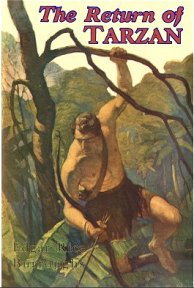 De Coude
himself escorted Tarzan to the office of General Rochere, the chief of
the bureau to which Tarzan would be attached if he accepted the position.
There the count left him, after a glowing description to the general of
the many attributes possessed by the ape-man which should fit him for the
work of the service.
De Coude
himself escorted Tarzan to the office of General Rochere, the chief of
the bureau to which Tarzan would be attached if he accepted the position.
There the count left him, after a glowing description to the general of
the many attributes possessed by the ape-man which should fit him for the
work of the service.
A half hour later Tarzan walked out of the office the possessor of
the first position he had ever held. On the morrow he was to return for
further instructions, though General Rochere had made it quite plain that
Tarzan might prepare to leave Paris for an almost indefinite period, possibly
on the morrow.
It was with feelings of the keenest elation that he hastened home
to bear the good news to D’Arnot. At last he was to be of some value in
the world. He was to earn money, and, best of all, to travel and see the
world.
He could scarcely wait to get well inside D’Arnot’s sitting room before
he burst out with the glad tidings. D’Arnot was not so pleased.
“It seems to delight you to think that you are to leave Paris, and
that we shall not see each other for months, perhaps. Tarzan, you are a
most ungrateful beast!” and D’Arnot laughed.
“No, Paul; I am a little child. I have a new toy, and I am tickled
to death.”
And so it came that on the following day Tarzan left Paris en route
for Marseilles and Oran.
|
 De Coude accompagna Tarzan jusqu’au bureau du général Rochère,
chef du département auquel Tarzan serait attaché s’il acceptait
ce poste. Là le comte le laissa après une description enflammée
de ses capacités et mérites.
De Coude accompagna Tarzan jusqu’au bureau du général Rochère,
chef du département auquel Tarzan serait attaché s’il acceptait
ce poste. Là le comte le laissa après une description enflammée
de ses capacités et mérites.
Une demi-heure plus tard, Tarzan ressortait avec
le premier emploi qu’il avait jamais eu. Il devait revenir le lendemain
pour de plus amples instructions. Mais le général Rochère
l’avait déjà prévenu qu’il allait quitter Paris, peut-être
dès le lendemain, pour une durée indéterminée.
Tarzan se dépêcha d’aller faire part
de la nouvelle à d’Arnot. Il jubilait. Enfin il était quelqu’un
aux yeux du monde. II allait gagner de l’argent et surtout, voyager et voir
du pays. Il éclata de joie devant son ami. D’Arnot se montra moins
enthousiaste.
«Vous semblez ravi de quitter Paris et de
ne plus me [p.66] voir, pour
plusieurs mois peut-être. Vous êtes un monstre d’ingratitude.»
Et d’Arnot se mit à rire.
«Non. Paul. Je suis comme un enfant. J’ai
un nouveau jouet, et je suis fou de joie.»
Le lendemain, Tarzan quitta Paris, à destination
de Marseille et d’Oran.
D’après
l’édition de 1970 dans la collection Édition spéciale,
n°2, © 1970 Éditions Publications Premières, Paris.
|
|
BIBLIOGRAPHIE SOMMAIRE
 Premières éditions étatsuniennes
Premières éditions étatsuniennes
Edgar Rice BURROUGHS, «The Return of Tarzan» in New Story
Magazine (June, July, August, September, October, November & December
1913).
Edgar Rice BURROUGHS, The Return of Tarzan
[365 p. ; couverture portant la même illustration due à N.
C. Wyeth que sur la couverture du numéro d’août 1913 de New
Story Magazine; 26 illustrations de J. Allen St. John], New York, A. C.
McClurg, 1915.
Éditions
étatsuniennes ultérieures
Bill & Sue-On HILLMAN, «1910s Part
1, Pulp Magazine 1912-1913, Illustrated Bibliography», in ID., ERBzine,
The First and Only Online Fanzine Devoted to the Life and Works of Edgar
Rice Burroughs, http://www.erbzine.com/mag2/0221.html, en ligne en 2005.
Bill & Sue-On HILLMAN, «The Return
of Tarzan. Publishing History (USA)», in ID., ERBzine, The First
and Only Online Fanzine Devoted to the Life and Works of Edgar Rice Burroughs,
http://www.erbzine.com/mag4/0484.html,
en ligne en 2005.
 Éditions néerlandaises
Éditions néerlandaises
Marten JONKER, Nederlandse Bibliografie
van Edgar Rice Burroughs, http://home-2.worldonline.nl/~cb000874/,
en ligne en 2005.
Éditions françaises
Edgar Rice BURROUGHS, Le Retour de Tarzan
[in-16; 190 p.; figures; traduit par Pierre Cobor; illustrations de Souriau],
Paris, Hachette, 1938.
Edgar Rice BURROUGHS, Le Retour de Tarzan
[traduction d’Anne Frejer], Paris, Édition
spéciale [«Tarzan» 2], 1970.
Edgar Rice BURROUGHS, Le Retour de Tarzan
[22 cm; 226 p.; traduction de Marc Baudoux; introduction par Jacques
Van Herp], Paris, Néo [«Tarzan» 2], 1986.
Marianne COSTA [adaptatrice] & Edgar Rice
BURROUGHS, Le retour de Tarzan, adapté de l’américain
par Marianne Costa [18 cm; 188 p., illustrations couleur de Marcel
Laverdet], Paris, Hachette jeunesse [«Bibliothèque verte»
32], 1993.
Edgar Rice BURROUGHS, Le Retour de Tarzan
[18 cm; 315 p.; trad. de l’américain par Marc Baudoux], Paris,
10-18 [«Domaine étranger» 2964], 1998.
Michel VANNEREUX, «The return of Tarzan» [bibliographie], in La
Tribune des amis d’Edgar Rice Burroughs, http://www.stellarque.com/ERB/romans/tarzan/tarzan02.htm#es,
en ligne en 2005.
Adaptations cinématographiques
 Harry J. REVIER [réalisateur],
Robert SAXMAR [scénariste], The Return of Tarzan (avec
Gene Pollar) [film noir et blanc 35 mm de 1h33, dont aucune copie ne semble
avoir survécu], USA, Great Western Producing Company & Numa
Pictures Corporation (distribution: Goldwyn Distributing Company), 1920
Harry J. REVIER [réalisateur],
Robert SAXMAR [scénariste], The Return of Tarzan (avec
Gene Pollar) [film noir et blanc 35 mm de 1h33, dont aucune copie ne semble
avoir survécu], USA, Great Western Producing Company & Numa
Pictures Corporation (distribution: Goldwyn Distributing Company), 1920
[Casting : Gene Pollar (Tarzan), Karla Schramm
(Jane), Estelle Taylor (Countess de Coude), Armand Cortes (Nikolas Rokoff),
Franklin B. Coates (Paul D’Arnot), George Romain (Count de Coude), Walter
Miller (Henchman to Rokoff)].
D. Ross LEDERMAN [réalisateur], Tarzan’s Revenge
(avec Glenn Morris) [film], USA, 1938.
Bill & Sue-On HILLMAN, «The Revenge
of Tarzan (1920) aka The Return of Tarzan», in «ERBzine Silver
Screen Series. A Resource Guide to the Movies of Edgar Rice Burroughs»,
in ID., ERBzine, The First and Only Online Fanzine Devoted to the Life
and Works of Edgar Rice Burroughs, http://www.erbzine.com/mag5/0588.html,
en ligne en 2005.
Adaptations en
bandes dessinées
Rex MAXON, The Return of Tarzan [60 bandes quotidiennes],
1929. Plusieurs rééditions sous forme de comics. Des
adaptations en France de ces bandes quotidiennes dans différentes
publications.
Thomas YEATES [scénariste, dessinateur,
encreur] & James SINCLAIR [coloriste], The Return of Tarzan [en
3 albums], USA, James Sinclair [«Dark Horse Comics»], 1997.
Toute critique, correction ou contribution
sera la bienvenue. Any criticism or contribution
welcome.
|
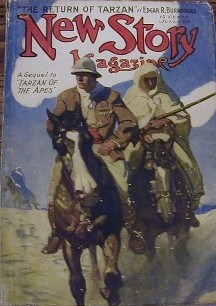
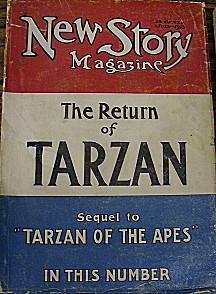
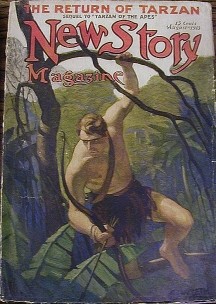



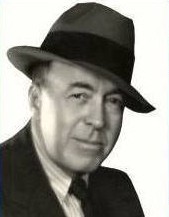 Edgar Rice Burroughs (1875-1950) a imaginé
le personnage de Tarzan dès 1888, mais sa première aventure
ne fut éditée qu’en 1912, en feuilleton, par le magazine
New Story. Dès l’année suivante il y fut donnée
une suite, The Return of Tarzan.
Edgar Rice Burroughs (1875-1950) a imaginé
le personnage de Tarzan dès 1888, mais sa première aventure
ne fut éditée qu’en 1912, en feuilleton, par le magazine
New Story. Dès l’année suivante il y fut donnée
une suite, The Return of Tarzan. 
 Premières éditions étatsuniennes
Premières éditions étatsuniennes Éditions néerlandaises
Éditions néerlandaises Harry J. REVIER [réalisateur],
Robert SAXMAR [scénariste], The Return of Tarzan (avec
Gene Pollar) [film noir et blanc 35 mm de 1h33, dont aucune copie ne semble
avoir survécu], USA, Great Western Producing Company & Numa
Pictures Corporation (distribution: Goldwyn Distributing Company), 1920
Harry J. REVIER [réalisateur],
Robert SAXMAR [scénariste], The Return of Tarzan (avec
Gene Pollar) [film noir et blanc 35 mm de 1h33, dont aucune copie ne semble
avoir survécu], USA, Great Western Producing Company & Numa
Pictures Corporation (distribution: Goldwyn Distributing Company), 1920